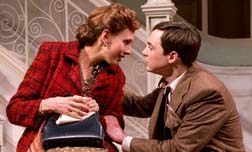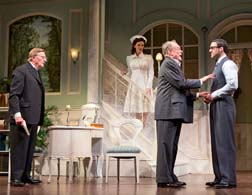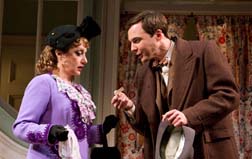By Lucy Komisar
“Harvey” is a cute fantasy for adults produced in 1944, a difficult era when some Americans were perhaps considering the meaning of life in the wake of the horrors of war. It was a time when a sermon of how to live the right life, proposing simple goodness against social climbing, could win a Pulitzer Prize for its author Mary Chase. That wouldn‘t happen today: there are no hard edges even in the work‘s social criticism. The play lacks bite. Director Scott Ellis keeps the 40s mood rather than looking for irony.

So “Harvey” now floats on the superior acting of its cast, especially Jessica Hecht as the fraught Veta Louise Simmons. She is ever distraught at the difficulty of trying to make a socially advantageous match for her daughter Myrtle Mae (Tracee Chimo), who has no particular charms, and trying to keep the family reputation from being dragged down by her nutty brother Elwood Dowd ( Jim Parsons), who at 39 imagines he is accompanied everywhere by a giant rabbit named Harvey. Rather, Harvey is a “pooka,” which makes him anthropomorphic.
They inhabit Denver, Colorado, but this could be anywhere in America, where the social-climbing Veta has invited ladies she wishes to impress to an afternoon musicale in the living room; she hopes it will get her into the social pages.

It would be easier for Veta if Elwood didn‘t own the house they live in and turn up, with Harvey, at inopportune moments. Their mother left the house and money to Elwood, so he doesn‘t work. He and Harvey hang out at bars.
Elwood is a very polite fellow with a quizzical smile who is nice to everyone, especially the ladies, with whom he gallantly flirts. Jim Parsons’ performance has the appeal of Matthew Broderick‘s permanent persona, if you like wide-eyed sweet and bland. They even look alike.
Elwood‘s threat to Myrtle‘s marriage plans persuades Veta to try to get him, with the help of a family friend judge (Larry Bryggman), committed to a local psychiatric hospital. She is so nervous on arrival that Elwood wanders off, and the admitting doctor thinks she is the one the judge called him to commit. A minor disaster ensues, giving Hecht the opportunity to perform her best comic bit as she makes a melodramatic ascent of a staircase.

The head of the hospital (Charles Kimbrough) learns of the mistake only when his wife Betty (the incomparable ditzy Carol Kane) tells him that Elwood has returned looking for his friend, who is a very tall fellow named Harvey. By the way, Harvey is invisible to us as well as to the other characters, presumably aside from Elwood.
When there‘s a chance to give Elwood medication that will turn him into “a normal human being” instead of a good-natured but disturbed fellow with hallucinations, Veta must consider whether that‘s what she really wants.
It‘s a feel-good play which left people in the 1940s smiling. Although it seems dated, it raises some laughs in today‘s audiences. Especially thanks to Hecht and Kane.
Harvey. Written by Mary Chase; directed by Scott Ellis. Roundabout Theatre Company at Studio 54, 254 West 54th Street, New York City. 212-719-1300. Opened June 14, 2012; closes August 5, 2012. Review on NY Theatre-Wire site.

